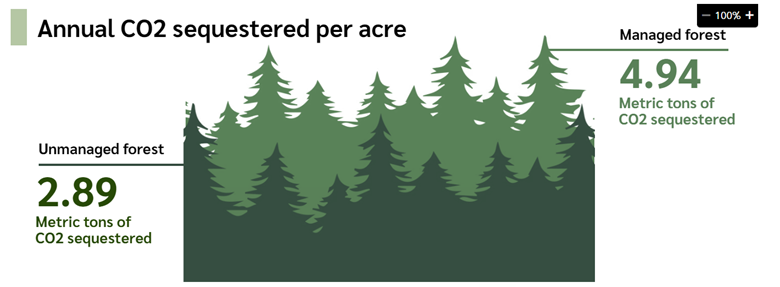January 12, 2024
(press release)
–
Working forests vital to jobs and mitigating climate change Working forests are critical to addressing climate change, a University of Washington study finds. Research examining private, state and federal forests found sustainably managed working forests and the wood products they create play an important role in removing greenhouse gases from our air and keeping that atmospheric carbon sequestered. In fact, applying global warming mitigation metrics, the report found privately owned and managed forests to be the “best-performing forest land and the USFS forest continued to be the worst-performing.” This study, published in Washington State University’s School of Economic Sciences annual report, uses the 2002 to 2017 Washington state’s forest carbon flux data produced by the U.S. Forest Service (USFS) Forest Inventory Analysis (FIA). The FIA data includes a comprehensive assessment of forest growth, harvest, and natural mortality. The study shows that managed forests sequester carbon from the atmosphere at a greater rate than unmanaged forests and have significantly lower natural mortality. On average, Washington’s managed forests grow 70% faster per acre (4.92 tons of CO2 per year) than the unmanaged USFS forests (2.88 tons of CO2 per acre per year). While managed forests lose about 14% of their annual growth to natural tree mortality, disease, and fire each year, the unmanaged federal forests lose 71% of their growth due to tree mortality from insects, disease, and fire. Washington’s healthy, productive working forests support economic growth, generate tax revenues, and create jobs working for a greener, sustainable environment. Washington is the second largest softwood lumber producer in the United States, second only to Oregon. Each year, private and public working foresters sustainably harvest 2.8 billion board feet of timber, enough wood to build 350,000 homes. Managed forests are harvested responsibly to produce wood products while doing critical work to keep forests healthy, such as managing tree density, removing underbrush, and replanting multiple trees for each one harvested. In turn, the additional carbon stored in wood products increases the storage capacity of each acre. Managed forests create good paying forest industry jobs that support local economies. Working forests form the foundation of the timber industry that supports more than 102,000 workers and generates $6 billion in wages annually. Our working forests sustain the 3rd largest manufacturing industry in Washington and thousands of people rely on working forests supporting families and local communities, producing environmentally and climate-friendly forest products for us to enjoy. Washington’s forests and wood products offset 35% of our state’s carbon emissions, in addition to protecting cool, clean water that flows through 60,000 miles of forested streams. While all forests have been carbon sinks, we have witnessed an unprecedented amount of carbon released in recent decades due to fires. This is especially the situation within the formerly working forests on federal lands, now unmanaged where an accumulation of dead and dying trees have created dangerous fuel loads in densely packed forests. The analysis further concludes increasing use of wood products in building construction from Washington-grown trees provides even greater environmental benefits and is a more “environmentally responsible alternative.” The Pacific Northwest’s robust wood products industry further improves the net global warming mitigation potential of Washington’s forest sector since “fast-growing forests play a vital role in the global carbon cycle as they can sequester and store large amounts of carbon in the forests over relatively short time periods.”Managed forests store more atmospheric carbon than federal lands, UW study finds

* All content is copyrighted by Industry Intelligence, or the original respective author or source. You may not recirculate, redistrubte or publish the analysis and presentation included in the service without Industry Intelligence's prior written consent. Please review our terms of use.




